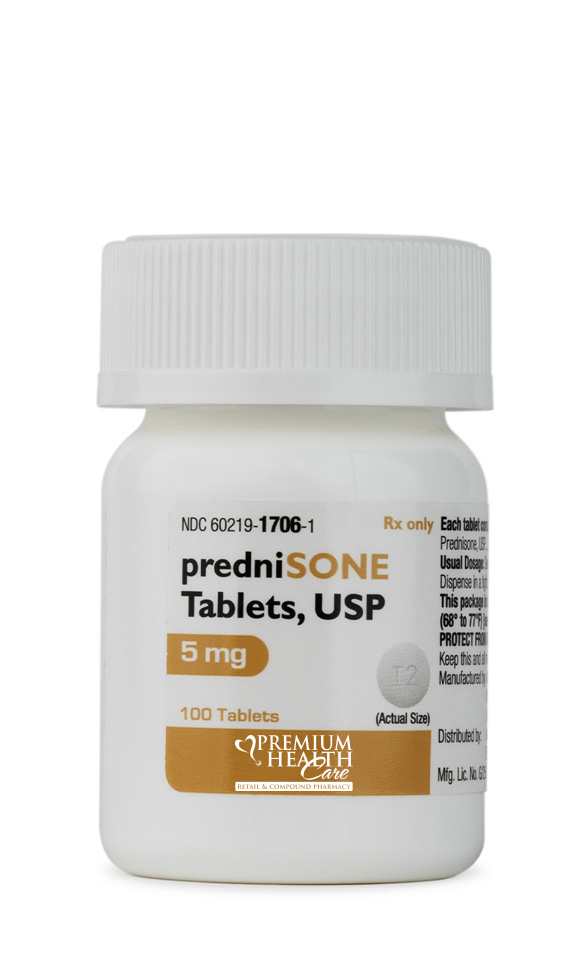Description
About Prednisone Tablets
Prednisone is a corticosteroid that may assist with a wide range of inflammatory, autoimmune, and allergic conditions. Once metabolized by the liver into its active form, prednisolone, it may exert anti-inflammatory and immunosuppressive effects. As a synthetic derivative of cortisone, prednisone may potentially help relieve swelling, redness, itching, and allergic reactions by working on the immune system.[1]
Mechanisms of Action
Prednisone may help reduce inflammation through various mechanisms. It may potentially inhibit the migration of polymorphonuclear leukocytes to inflammation sites and may help reverse increased capillary permeability. It may also help suppress the immune system by potentially decreasing the activity and volume of immune responses.
After binding to glucocorticoid receptors, prednisone may alter gene transcription, potentially resulting in reduced inflammation. Additionally, it may potentially decrease the number of circulating lymphocytes, induce cell differentiation, and stimulate apoptosis in certain tumor cell populations.[1]
Contraindications & Precautions
Prednisone is contraindicated in patients with known hypersensitivity to the drug or its components. It should also be used with caution in the following conditions:
Immunosuppression Risk:
Corticosteroids may increase susceptibility to infections, potentially even at lower doses. Studies suggest that prolonged corticosteroid use may increase Pneumocystis jirovecii Pneumonia (PJP) risk, particularly in non-HIV immunocompromised patients.[2]
Systemic Fungal Infections:
Corticosteroid use is not recommended when systemic fungal infections are present, as it may potentially exacerbate these conditions.[3]
Latent or Active Tuberculosis:
Cases of reactivated latent tuberculosis have been reported in patients receiving corticosteroids.[4]
Viral Infections:
Studies suggest an increased risk of infection exacerbation due to its potential immunosuppressive effects.[5]
Pre-existing Cardiovascular Conditions:
Glucocorticoids, including prednisone, may potentially exacerbate cardiovascular issues, potentially leading to complications such as dyslipidemia and hypertension. This risk may be particularly significant with high doses or prolonged use of the medication. Risk modification strategies, such as low-dose or alternate-day therapy, may help mitigate these potential complications.[6]
Gastrointestinal Disorders:
Corticosteroid use may be associated with an increased risk of gastrointestinal bleeding, particularly in hospitalized patients. Caution and appropriate monitoring may be warranted.[7]
Risk of Anaphylaxis:
Although uncommon, anaphylactic reactions have been reported with corticosteroid use.[8]
NOTE: This is not a comprehensive list of all possible contraindications and precautions.
Interactions
NSAIDs:
Use may increase the risk of gastrointestinal ulcers and bleeding.[9]
Anticoagulants:
Use may potentially affect the action of anticoagulants such as warfarin, possibly increasing its effects. Users taking both prednisone and anticoagulants may require more frequent blood monitoring.[10]
Antidiabetic medications:
Use may potentially raise blood glucose levels, which may require adjustments in antidiabetic drug dosages.[11]
Live vaccines:
Live or live-attenuated vaccines are contraindicated for individuals receiving immunosuppressive doses of prednisone. Potential immunosuppressive effects of prednisone may increase the risk of infection from these vaccines.[1]
CYP450 inducers (e.g., rifampin):
Certain medications, such as rifampin, that induce CYP450 enzymes may potentially decrease the effects of prednisone.[12]
CYP450 inhibitors (e.g., ketoconazole):
Certain medications, such as ketoconazole, that inhibit CYP450 enzymes may potentially elevate prednisone levels, thus increasing its effects.[13]
Diuretics:
Use of prednisone with diuretics may worsen electrolyte imbalances caused by diuretics, particularly hypokalemia.[14]
NOTE: This is not a comprehensive list of medications that may interact with prednisone. For a complete understanding of potential interactions, please consult a healthcare professional or specialized resource.
Adverse Reactions / Side Effects
Prednisone may cause a range of side effects, particularly when used at high doses for extended periods of time. These adverse effects can impact multiple body systems.
Metabolic changes may include hyperglycemia, increased appetite and weight gain. Cardiovascular issues may occur, such as hypertension and dyslipidemia. Musculoskeletal concerns include osteoporosis and an elevated risk of fractures.
Prednisone may also affect the skin, causing fragility and delayed wound healing. Ocular conditions, particularly cataracts, may develop with prolonged use. Additionally, prednisone can suppress the immune system, increasing susceptibility to infections. Edema is another potential side effect.
Long-term use of prednisone may cause adrenal suppression, which may manifest as adrenal insufficiency during stressful events or sepsis.[1]
NOTE: This list may not include all possible adverse reactions or side effects.
Pregnancy & Breastfeeding
Prednisone use during pregnancy has been associated with certain risks. While some studies suggest a modest increase in the risk of cleft lips with or without palate, the data is conflicted and may be confounded by maternal disease. Current evidence does not strongly support an independent association between systemic corticosteroid use and increased risks of preterm birth, low birth weight, or preeclampsia. The relationship between corticosteroids and gestational diabetes mellitus remains unclear due to insufficient evidence.[15]
If treatment with prednisone is necessary during pregnancy, a thorough discussion of the potential risks and benefits should be conducted with a healthcare provider.
Prednisone passes into breast milk in small amounts, with no reported adverse effects in breastfed infants. Short-term or low dose use during lactation is generally considered safe, though high doses or prolonged use may reduce milk supply.[16]
If treatment with prednisone is necessary during breastfeeding, a thorough discussion of the potential risks and benefits should be conducted with a healthcare provider.
Storage
Store this medication at 68°F to 77°F (20°C – 25°C) and away from heat, moisture and light. Keep all medicine out of the reach of children. Throw away any unused medicine after the beyond use date. Do not flush unused medications or pour down a sink or drain.
References
Puckett Y, Gabbar A, Bokhari AA. Prednisone. [Updated 2023 Jul 19]. In: StatPearls [Internet]. Treasure Island (FL): StatPearls Publishing; 2024 Jan-. Available from: https://www.ncbi.nlm.nih.gov/books/NBK534809/- LinkOpens in New Tab
Quigley N, d’Amours L, Gervais P, Dion G. Epidemiology, Risk Factors, and Prophylaxis Use for Pneumocystis jirovecii Pneumonia in the Non-HIV Population: A Retrospective Study in Québec, Canada. Open Forum Infect Dis. 2023 Dec 18;11(1):ofad639. doi: 10.1093/ofid/ofad639. PMID: 38274551; PMCID: PMC10810061.
Li Z, Denning DW. The Impact of Corticosteroids on the Outcome of Fungal Disease: a Systematic Review and Meta-analysis. Curr Fungal Infect Rep. 2023;17(1):54-70. doi: 10.1007/s12281-023-00456-2. Epub 2023 Feb 23. PMID: 36852004; PMCID: PMC9947451.
Patil S, Jadhav A. Short Course of High-dose Steroids for Anaphylaxis Caused Flare Up of Tuberculosis: A Case Report. J Transl Int Med. 2019 Mar 29;7(1):39-42. doi: 10.2478/jtim-2019-0008. PMID: 30997356; PMCID: PMC6463822.
Price NB, Grose C. Corticosteroids Contribute to Serious Adverse Events Following Live Attenuated Varicella Vaccination and Live Attenuated Zoster Vaccination. Vaccines (Basel). 2021 Jan 6;9(1):23. doi: 10.3390/vaccines9010023. PMID: 33418856; PMCID: PMC7825138.
Sholter DE, Armstrong PW. Adverse effects of corticosteroids on the cardiovascular system. Can J Cardiol. 2000 Apr;16(4):505-11. PMID: 10787466.
Narum S, Westergren T, Klemp M. Corticosteroids and risk of gastrointestinal bleeding: a systematic review and meta-analysis. BMJ Open. 2014 May 15;4(5):e004587. doi: 10.1136/bmjopen-2013-004587. PMID: 24833682; PMCID: PMC4025450.
Sheth A, Reddymasu S, Jackson R. Worsening of asthma with systemic corticosteroids. A case report and review of literature. J Gen Intern Med. 2006 Feb;21(2):C11-3. doi: 10.1111/j.1525-1497.2005.00290.x. PMID: 16606375; PMCID: PMC1484654.
Moore N, Pollack C, Butkerait P. Adverse drug reactions and drug-drug interactions with over-the-counter NSAIDs. Ther Clin Risk Manag. 2015 Jul 15;11:1061-75. doi: 10.2147/TCRM.S79135. PMID: 26203254; PMCID: PMC4508078.
Liu D, Ahmet A, Ward L, Krishnamoorthy P, Mandelcorn ED, Leigh R, Brown JP, Cohen A, Kim H. A practical guide to the monitoring and management of the complications of systemic corticosteroid therapy. Allergy Asthma Clin Immunol. 2013 Aug 15;9(1):30. doi: 10.1186/1710-1492-9-30. PMID: 23947590; PMCID: PMC3765115.
Tamez-Pérez HE, Quintanilla-Flores DL, Rodríguez-Gutiérrez R, González-González JG, Tamez-Peña AL. Steroid hyperglycemia: Prevalence, early detection and therapeutic recommendations: A narrative review. World J Diabetes. 2015 Jul 25;6(8):1073-81. doi: 10.4239/wjd.v6.i8.1073. PMID: 26240704; PMCID: PMC4515447.
McAllister WA, Thompson PJ, Al-Habet SM, Rogers HJ. Rifampicin reduces effectiveness and bioavailability of prednisolone. Br Med J (Clin Res Ed). 1983 Mar 19;286(6369):923-5. doi: 10.1136/bmj.286.6369.923. PMID: 6403136; PMCID: PMC1547305.
B Ulrich, F J Frey, R F Speck and B M Frey. Pharmacokinetics/pharmacodynamics of ketoconazole-prednisolone interaction. Journal of Pharmacology and Experimental Therapeutics February 1, 1992, 260 (2) 487-490;
Liu C, Liu G, Zhou C, Ji Z, Zhen Y, Liu K. Potent diuretic effects of prednisone in heart failure patients with refractory diuretic resistance. Can J Cardiol. 2007 Sep;23(11):865-8. doi: 10.1016/s0828-282x(07)70840-1. PMID: 17876376; PMCID: PMC2651362.
Bandoli G, Palmsten K, Forbess Smith CJ, Chambers CD. A Review of Systemic Corticosteroid Use in Pregnancy and the Risk of Select Pregnancy and Birth Outcomes. Rheum Dis Clin North Am. 2017 Aug;43(3):489-502. doi: 10.1016/j.rdc.2017.04.013. PMID: 28711148; PMCID: PMC5604866.
Drugs and Lactation Database (LactMed®) [Internet]. Bethesda (MD): National Institute of Child Health and Human Development; 2006-. Prednisone. [Updated 2024 Apr 15]. Available from: https://www.ncbi.nlm.nih.gov/books/NBK501077/






Reviews
There are no reviews yet.